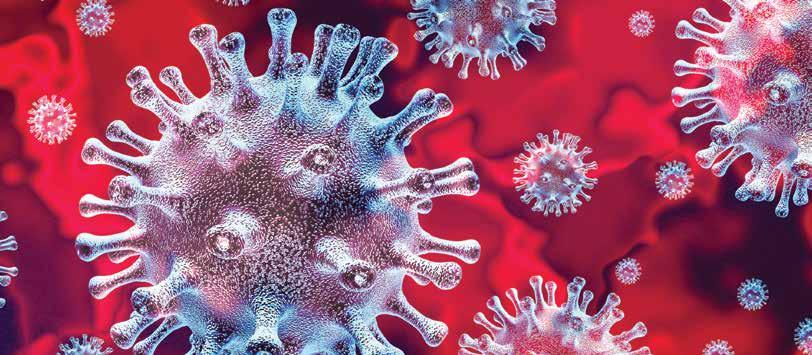
4 minute read
RUTGERS–CAMDEN RESPONDS TO COVID-19
These stories explore three Rutgers University–Camden responses to the global crisis. For updates related to Rutgers and COVID-19, visit coronavirus.rutgers.edu.
Predicting Demand for New Jersey Hospital Beds
Advertisement
A multidisciplinary team of Rutgers University–Camden researchers in March worked around the clock to develop models predicting when New Jersey hospitals could surpass capacity due to the spread of COVID-19. The university’s Senator Walter Rand Institute for Public Affairs and the Center for Computational and Integrative Biology, in collaboration with New Jersey Health Initiatives, released two research reports that compared estimates of available hospital beds in New Jersey counties with the likely demand for those beds during the pandemic. Rutgers–Camden researchers in computer science, math, nursing, psychology, and public policy contributed to the timely research. “We did this study to show the local impact of a global disease,” said Sarah Allred, lead researcher on the study and
Coping Through Nostalgia
By Tom McLaughlin
Throughout the world, many are struggling with the mental toll of the
COVID-19 pandemic. “People are faculty director for the Rand Institute. “This information will help state and local governments in deciding how to prioritize resources.”
The analysis stressed a major need for more coronavirus testing in New Jersey. It also showed the impact of social distancing measures in delaying when hospitals would reach capacity. The difference between strong and moderate measures was plotted over a three-month period and highlighted that under only moderate social distancing measures, several New Jersey hospitals would reach peak capacity in less than a month. “This localized study shows not only how important strong social distancing efforts are across the nation, but also how they protect our family, friends, and frontline workers,” Allred said.
To view research produced by the Rand Institute about COVID-19, visit rand. camden.rutgers.edu. worried about the well-being of family and friends,” said Andrew Abeyta, an assistant professor of psychology. “They are worried about their jobs, and how the virus will impact their goals going forward.”
The Rutgers–Camden researcher said people have a fundamental need
Nursing in a Wartime Scenario
While millions of Americans stay safely at home during the COVID-19 pandemic, nurses—including many of the more than 3,000 who are Rutgers–Camden nursing graduates—answer the call to serve. “Nurses continue to care for patients 24 hours a day, seven days a week,” said Donna Nickitas, dean of the Rutgers School of Nursing–Camden. “It’s the nurse who is staying right there on the front lines during this health crisis.”
Nickitas, a retired U.S. Air Force to maintain a sense of meaning in life, defined as a person’s sense that their lives are purposeful, significant, and coherent. Abeyta said one way to deal with fears is to tap into the power of nostalgia, which can have profound psychological benefits during periods of uncertainty. “People naturally turn to
Nurse Reserve Corps major, said the tremendous challenge of this pandemic, which has been compared to a wartime scenario, is a shortage of personal protective equipment. “When you go out into the battlefield, you have everything you need on your body for your safety and protection, particularly during an emergency or in case of a crisis,” she said. “Nurses want to protect the public, while at the same time being battleground ready.”
Nickitas said the situation, which can be unsafe for nurses without the nostalgia during such difficult times, and for good reason,” Abeyta said. “Nostalgia is a potent reminder of what makes our lives meaningful. For example, when people engage in nostalgic reverie, we are usually thinking about our most meaningful relationships—the people who love us, make us feel important, and

appropriate protection, has forced nurses and nursing educators to confront new ways of responding. “We have to use the technology that is available to us to continue to advance our practice,” she said.
The School of Nursing, which utilizes various remote learning platforms, is establishing telemedicine options to continue offering care by faculty and students to the community in a safe manner. “We want to provide safe care that protects us and the patients,” Nickitas said.
She said nurses also play a role in give us confidence.”
He said people also may reflect on special accomplishments or personal successes. “Either way, these memories can be reassuring in the face of uncertain times and make us feel optimistic about finding meaning in the face of tragedy,” Abeyta said. helping to persevere. “We want to stay hopeful. This too will pass. If we remain resilient, we will succeed.”
EMERGENCY STUDENT FUND:
You can help students in crisis by making a gift that supports those in need. Visit give.rutgers.edu and choose the Rutgers University–Camden Chancellor’s
Emergency Fund, or call 856-225-6028.
In a time of isolation brought on by social distancing, nostalgia also can help people to satisfy basic social needs. “Reflecting nostalgically on meaningful experiences with family and friends can help ease loneliness when people are unable to directly interact with others,” he said.










